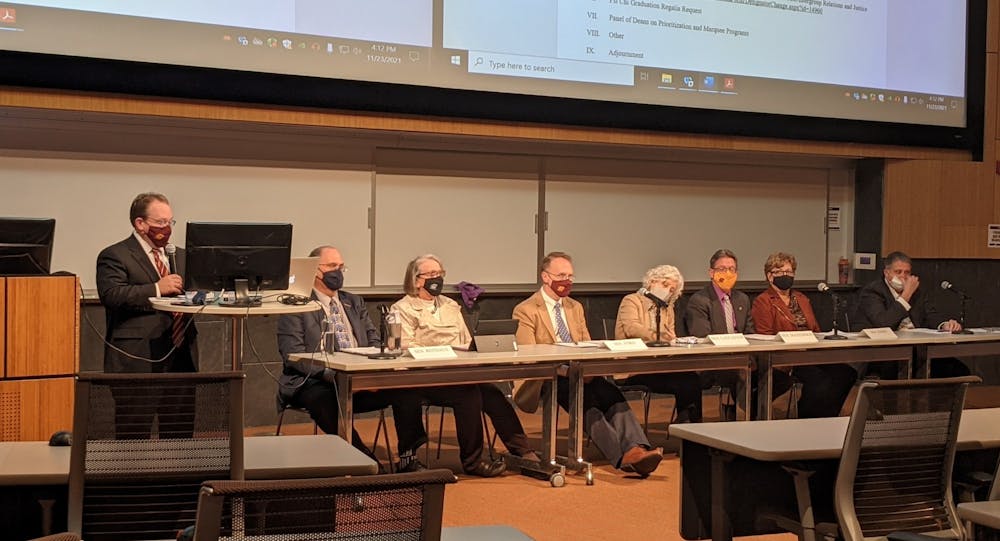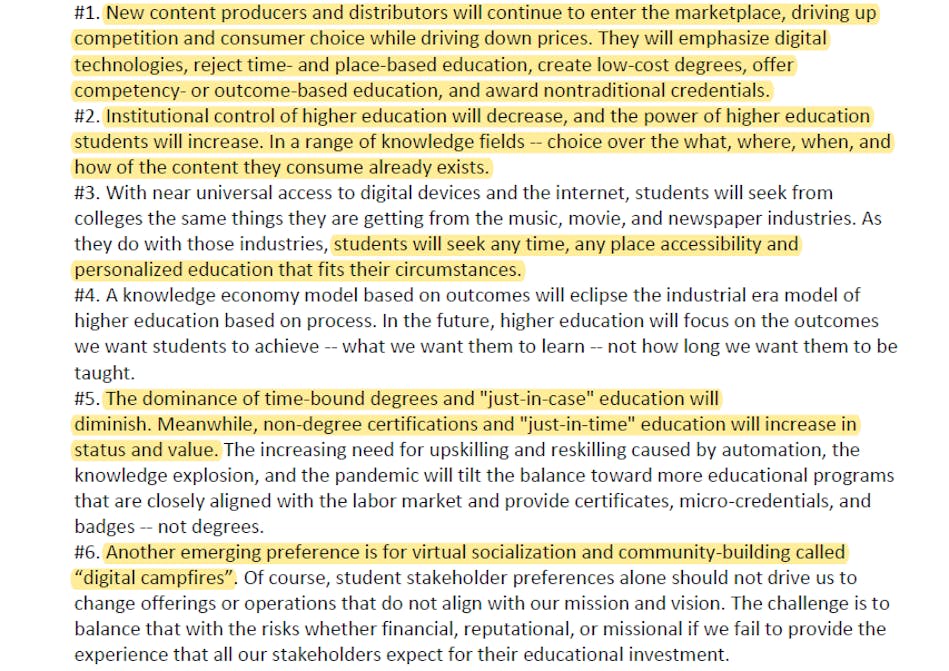Academic Senate discusses program prioritization, strategic pathways

President Bob Davies (left) gives an opening statement to introduce a panel of deans Nov. 23, 2021 in the French Auditorium. The panel gave details on the marquee prioritization process and answered questions from senators.
The Academic Senate discussed marquee programs and strategic pathways for the future of Central Michigan University at its biweekly Tuesday meeting Nov. 23.
A panel of deans attended the meeting to answer questions and explain how each academic college will be prioritizing and marketing programs. Each college defined marquee from different angles, but all of the deans said decisions are made based on budgets and interest in programs.
President Bob Davies facilitated the panel and discussed the goals of marquee programs.
Davies said by highlighting areas considered marquee, the university will attract more students with its most unique programs. He used the meteorology undergraduate program as an example because it is the only one in Michigan.
Dean of the College of Education and Human Services Paula Lancaster said marquee programs are meant to bring attention to the whole university because it will introduce students to the rest of CMU’s options after they are enrolled.
“The rising tide lifts all boats,” Lancaster said.
Dean of the College of Science and Engineering David Ford said the list of marquee programs does not mean the university is “stepping away” from programs excluded from the list.
“Every (college) deserves more than they have right now,” Ford said. “That’s the position I find myself in. I’m saying ‘no’ constantly to things and I don’t like it.”
Faculty senators were also concerned with “watchlist” programs in danger of getting less support. The deans of each college shared their processes, but the senate ran out of time before the College of Medicine could respond.
College of Liberal Arts and Social Sciences
Dean Richard Rothaus said CLASS has a “deprioritized” list of programs with low enrollment, which also have difficulty supporting graduate assistant programs. The prioritization list can be found on the CLASS website.
College of Science and Engineering
Ford said CSE does not have a watchlist. However, he said in the future he will monitor for programs not performing as well as others.
College of Education and Human Services
Lancaster said the professional accreditation process of CEHS helps to keep a watch on programs. She said the term watchlist is used to track at-risk programs and turn them into potential marquee programs.
College of Health Professions
Dean Thomas Masterson Jr. said the accreditation of CHP’s programs makes all of them marquee, so there is no watchlist.
College of the Arts and Media
Interim Dean Betty Kirby said CAM has a list of programs not performing as well as others but does not call it a watchlist.
College of Business Administration
Dean Christopher Moberg said CBA is looking for ways to keep all of his programs and has never thought about cutting them.
Senate Chairperson Katrina Piatek-Jimenez said the discussion of marquee programs will continue at a future meeting.
Strategic pathways
Davies’ and Provost Mary Schutten’s discussed the Strategic Envisioning 2030 program meant to help CMU compete among changing trends in higher education during their joint report.
One part of that is increasing global engagement through online learning programs. The senators voiced questions and concerns about CMU’s plans for global engagement.
According to the joint report, the Online Content Committee is looking at four such programs for potential use: Coursera, LinkedIn Learning, Amesite and Everspring Partners. Some faculty senators worried what the programs could mean for in-person learning at CMU.
Senator Martha Frank, mathematics faculty member said the report was “a little bit alarming” and that it sounds like CMU will be turned into an online “diploma factory using expensive software.” Frank said faculty who are already at CMU should be consulted instead.
Schutten said curricular decisions like these should remain in the hands of faculty.
Senator David Smith, philosophy and religion faculty member, echoed Frank’s comments and pointed out that the plan seems to involve a CMU that is no longer “place and time-based.”
“I don’t think I’m alone in finding the rhetoric in the report to be deeply cringeworthy,” Smith said. “I hope we don’t lose sight of the fact that this is an educational institution, and education involves more than credentialing, information and skills strength. It’s a matter of personal relationships. If we start thinking of what we’re doing as something that is no longer place and time based, you lose that personal dimension.”

An excerpt from the Nov. 23 president and provost's join report with some of the plans for online engagement highlighted. Several senators expressed concern for what the shifts could mean to CMU's current in-person offerings.
Davies said the goal of the program is to add to what CMU already has without replacing it.
Schutten said the number of high school graduates enrolling at colleges is decreasing and the strategic pathways from the report are a way to attract students from global and other non-traditional backgrounds.
Davies also commented on CMU’s trend of enrollment decline. Problems with new enrollment software and the old age of the cmich.edu website have been obstacles for new students. He said CMU’s incoming website overhaul will be more of a recruitment tool than the current site.
“If you look at our website right now, it’s not necessarily an enrollment tool, it’s more of an information dump, Davies said.”
Senate meetings are held from 3:30-5 p.m. bi-weekly on Tuesdays in the French Auditorium. Livestream and recording links can be found on the senate website.






